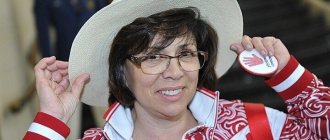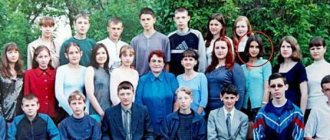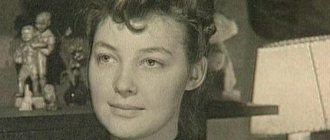Irina Fedorovna Godunova (reconstruction based on the skull).
The life of Irina Godunova , the wife of Fyodor I Ioannovich and the sister of Boris Godunov, could be an excellent plot for an exciting detective novel or adventure film. The figure of the first sole ruler of Rus' is as interesting as it is mysterious: according to some historians, Irina is an ordinary weak woman in power who, having become a widow, fell victim to the prejudices of the “dark” people and their reluctance to see a “woman” on the throne; others are inclined to the idea that the vain Godunova slightly lacked the strength to maintain control over the throne after the death of her feeble-minded husband; adherents of the Russian church consider Irina Godunova to be the “Christ-loving spouse” of the canonized Tsar.
Childhood in the royal chambers
The future Tsarina Irina was born into a poor family of a Vyazma nobleman, presumably in 1557; the exact date has not been preserved. Parents: Fyodor Ivanovich, a descendant of the Kostroma boyars, and Stefanida Ivanovna. The mother of Irina and Boris Godunov, after the early death of her husband, took monastic vows, becoming nun Snandulia. The action of a widowed noblewoman can be easily understood: at that time, it was quite difficult to raise and raise two children without a solid inheritance. In the monastery, the woman received shelter, food and spiritual guidance. In addition, the childless uncle of the orphaned Godunovs happily took his nephews to the court for his care. Dmitry Ivanovich held the post of head of the Bed Prikaz - he was a close associate of the tsar, had the right to enter the chambers and the opportunity to have a personal conversation with the sovereign.
Boris Godunov's sister received an excellent education for those years. The uncle had weight at court, so the best conditions were created for the girl - an extensive library, private teachers and fun in the company of the heirs to the throne. Irina Godunova grew up at court, along with the royal children, so her marriage to Fedor did not come as a surprise to the courtiers.
Biography of Irina Gerashchenko
Irina was born in the Ukrainian city of Cherkassy, May 15, 1971. She studied at secondary school No. 26. A passion for the humanities, interest in international relations and the media determined her choice of profession. After graduating from school in 1988, she went to study at the capital’s university (KSU named after T.G. Shevchenko).
Irina in her youth
Without hesitation, journalism became the choice of specialization. Irina always had an excellent command of words, so learning was easy. In 1993, the girl graduated from the university with honors.
After graduating from university, Irina Gerashchenko worked for five years on a Ukrainian television channel. At first, she was at the Molodist TV Production Association as an ordinary editor, in 1995 she moved to the editorial office of the Yunost programs, and in 1997 she was appointed group leader in the editorial office of the Vozrozhdenie studio.
During this period of time, her journalistic activity gradually became political. In 1998, Gerashchenko worked as a commentator, and then as an editor in a news service. Later, at the Inter TV channel, she became the head of the political department. The woman worked here until 2000. In the same year, in the summer, Irina was awarded the title “Honored Journalist of Ukraine.” Since 2001, the journalist has become the author of the television program “Special Signs” in the news agency “Profi-TV”.
Marriage and family life of Irina Godunova
By order of Tsar Ivan the Terrible, in 1575 the beautiful young maiden Irina became the official bride of Tsarevich Fyodor. The traditional bride parade did not take place for several reasons. First of all, Fyodor Ivanovich was endlessly in love with Irina Godunova from an early age, so he did not consider anyone else for the role of his wife. The king, knowing from himself how difficult family life can be, decided that the girl who grew up in the royal chambers under his vigilant gaze would become a good wife for the prince and, if she did not bring happiness, would not cause problems.
Tsar Ivan. art director Andrey Shishkin
Boris Godunov. Engraving. 1721
The bride’s uncle played an important role: Dmitry Ivanovich took care in advance to draw the sovereign’s attention to his talented and beautiful niece; in turn, Boris Godunov, who was gaining weight at court, became another argument in favor of choosing Irina as a bride. In addition, the heir to the throne at that time was his elder brother Ivan, so they did not pay much attention to Fedor and his marriage. After the death of Tsarevich Ivan Ivanovich in 1581, the serene and easy life of Irina and Fyodor changed dramatically - “a faster and a silent person, born more for the cell than for the sovereign power” began to be prepared for reign.
Tsar Fyodor I Ioannovich in the painting “The Secret of the Tsarev” P. Ryzhenko
Then the sovereign became concerned about the childlessness of his sons - Ivan did not leave any heirs, all the pregnancies of Fyodor’s wife ended in tears, and Tsarevich Dmitry was still a baby. Anticipating a political crisis against the backdrop of the absence of royal children, Grozny leaves a will: in the event of Godunova’s childlessness, Fyodor should take Irina Mstislavskaya as his wife, and Godunova should be tonsured as a nun. And it really did arrive at the monastery - Irina forcibly took monastic vows, only not from Godunov, but from Mstislavskaya. The brother of the future queen, Boris, took care of this.
After the crowning of Feodor I, the Godunov family strengthened its position in power. The current king had no interest in state affairs, devoting his time to pilgrimage, his wife, reading books and watching buffoons and peasant fights. Irina looked after her husband, helping and guiding him in everything. Godunov eliminated several members of the regency council appointed by Ivan the Terrible for his son Fyodor through intrigue, rising to the right hand of the head of state. As a result, to resolve important matters, everyone who applied was sent to Boris.
Fedor I Ioannovich. Engraving by Van Wergen.
A. Kivshenko. “Tsar Fyodor Ioannovich puts a gold chain on Boris Godunov”
Personal life of Irina
Irina Vladimirovna is a very secretive person. She always answers questions from journalists about her family:
“I protect my privacy. This is the key to a happy family. I value my family very much and I think you will understand that I do not want to talk much about this topic. My husband is far from the sphere of politics and journalism. That’s why I appreciate him.”
Irina Vladimirovna Gerashchenko
Even on social networks it is very difficult to find any information about the personal life of a famous politician, about her husband and children. Sometimes you come across photos of them, but only from the back. She very jealously hides any information about her family. For show there is only work and career.
Queen Irina Godunova - wife, widow, nun
The unusual nature of Irina Godunova’s reign began with the crowning of Fyodor I. Especially for the sovereign’s beloved wife, the ceremony was changed: windows were opened in one of the palace chambers and a throne was installed so that the people could see their new queen sitting there in rich outfits and decorations. Another innovation was Irina’s congratulatory speech addressed to the new tsar, delivered immediately after Metropolitan Dionysius. At the end of the ceremony, the reigning couple was showered with gold coins in the Tsarina's Chambers. There is no need to say that all these honors were the initiative of Irina Godunova herself; Tsar Fedor was indifferent to the magnificent celebrations and honors, as a modest and moderate person in everything.
Irina Godunova became the first Russian tsarina to lead an active political life - she was present at meetings of the Boyar Duma; corresponded with the English Queen Elizabeth I Tudor and the Kakhetian Queen Tinatin, wife of Alexander II; received ambassadors and even signed royal decrees. Meanwhile, the clouds of discontent among the boyars were gathering more and more over the queen. There were two reasons for this - the absence of heirs to the throne and the active interest of the king's wife, who was supposed to be involved in prayers and household chores, in politics and state affairs.
Elizabeth I Tudor (1533-1603); Zuccaro, Federico;
Irina, meanwhile, continues her correspondence with Queen Elizabeth of England. The latter had a great interest in the wealth of the Russian land and trade between countries on favorable terms. Irina, being the wife of Fyodor, the official Tsar, and the sister of Boris, the actual ruler, had influence on both men, which Elizabeth intended to take advantage of. The Queen of England sent a letter of praise, in which she extolled the beauty and wisdom of the Russian Tsarina, said that the news of this wisdom and honor had spread throughout the world, and called Boris Godunov her “blood loving friend,” as Muscovites then translated the English phrase “loving cousin”— "dear and kind cousin."
Irina’s brother, Boris Godunov, has been busy with the English nobles, asking for help for his childless sister. In 1585, Jerome Horsey sent a midwife from England to Rus' to help Irina:
“Back on August 15, 1585, Boris sent his equerry to Horsey with a note in which he urgently requested that the doctor arrive “stocked with everything necessary.” Horsey consulted with the best doctors in Oxford, Cambridge and London. In March 1586, Horsey received letters from Elizabeth to Tsar Fedor and, with the beginning of navigation, sailed to Russia. With him were the royal physician Robert Jacobi and the midwife.” — R.G. Skrynnikov “The Legacy of Grozny (Chapter 2)”
Meanwhile, the idea was unsuccessful - the midwife was detained in Vologda. It took Boris no little effort to “hush up” the situation and prevent it from being discussed in the Boyar Duma, since an appeal to “non-believers” and “heretics” would have led to a scandal, since it was unbecoming for a “heretic dokhtoritsa” to accept an Orthodox prince into the world.
Soon after these events, in 1586, Moscow Metropolitan Dionysius, Prince Shuisky, Krutitsy Archbishop Varlaam Pushkin and other boyars from the Duma submit a petition to the Tsar, “so that he, the sovereign, for the sake of childbearing, accepts a second marriage, and releases his first queen to the monastic rank.” .
Fyodor Ivanovich, contrary to his peaceful and kind nature, treated the petitioners harshly: Metropolitan Dionysius was deprived of his dignity and exiled to the Khutyn Monastery in Novgorod; Archbishop Pushkin was imprisoned in the Novgorod Anthony Monastery, and Vasily Shuisky was exiled to Buygorod. There was no more talk about the sovereign's second marriage.
Blessing of the Patriarch
Irina Godunova achieved the fulfillment of the long-standing dream of the Russian Church - the establishment of a patriarchal see in Rus'. In January 1589, Patriarch Jeremiah of Constantinople arrived in Moscow, established a patriarchal see in Russia, which equated the High Hierarch of the Russian Church with the Eastern patriarchs, and installed Metropolitan Job as Patriarch.
After the solemn ceremony, both patriarchs proceeded to the Golden Chamber to the queen. The outfit of Tsar Fedor’s wife amazed the guests with its luxury and wealth, as Arseny Elassonsky, an archbishop who was present at Irina Godunova’s reception, later wrote:
Patriarch of Constantinople Jeremiah II (1530-1595)
“The slightest part of this splendor would be enough to adorn a dozen kings.”
The crown was decorated with deep purple amethysts and large sapphires. The main hall, which later received the name “Golden Chamber,” was skillfully painted in gold and decorated with frescoes depicting scenes from the life of female rulers: Princess Olga, St. Helena, Queen Dinara. Queen Irina received the guests with cordiality and asked Patriarch Jeremiah for his blessing for the birth of an heir. And after the visit, Irina continued correspondence with the patriarch, sending him letters and generous gifts. In 1591, the patriarch sent her part of the relics of St. Mary Magdalene (“from the hand of the finger”) and “a crown of royal gold, with stone and pearls.”
After many failures, Irina and Fyodor finally had a daughter, Theodosia. May 29, 1592, 4 years before his father's death, in the 17th year of marriage. In honor of the birth of his daughter, Fyodor Ivanovich amnestied all prisoners, made huge donations to the monasteries, and sent Mikhail Agarkov and his comrades to Jerusalem and the land of Palestine, with rich gifts for the monasteries. There were rumors among the people that the heir born to the empress was replaced by a girl of simple origin by Boris Godunov; these rumors were not confirmed, but gave rise to many impostors at a later time. Unfortunately, Princess Feodosia Feodorovna did not live even two years, dying in infancy.
Security for the royal person
The piety of Irina and Fyodor was a well-known fact. The reigning couple regularly attended church services several times a day, and every week they went on pilgrimage to one of the monasteries. Every year, Irina, accompanied by 4,000 guards, walked on foot from Moscow to the Trinity-Sergius Lavra. Donations for the needs of churches and monasteries were particularly generous, for example, memorial contributions from the widow during the funeral of Tsar Feodor I amounted to 3,000 rubles - an amount unthinkable at that time.
Queen Dowager
At the age of 40, Fyodor I Ivanovich died after a short illness, leaving behind neither a successor nor a will. According to one version, when the king died, he left behind his wife on the throne; according to another, he asked her to go to a monastery in order to protect himself. Whatever the reality, the Godunovs presented the boyars with a letter with the royal will and all the necessary seals and signatures, which stated that Irina remained “for the kingdom”, and Patriarch Job and Boris Godunov were Fedorov’s executors. To avoid a popular revolt and prevent internecine war, the boyars swore allegiance to Irina.
Patriarch Job (miniature of the Royal Titular)
Obliged by his high position, Patriarch Job, showing his respect, instituted a “praying service for the empress” for the sole ruler, which had never been carried out before. Particularly zealous fans of the church called this action shamelessness and an attack on the holy church.
Irina reigned for a week, on the 9th day after the death of Fyodor, on the Red Porch the widow announced her abdication and entry into a monastery. It is difficult to judge what caused this. Perhaps Boris Godunov considered Irina’s power too shaky, perhaps the widow herself decided to abandon her ambitious plans and renounce reign. According to some versions, the degree of discontent among the people was too high, and the desire of Godunov’s wife, Maria Skuratova, to become a queen was too great.
On the day of her abdication, Tsarina Irina went to the Novodevichy Convent, took monastic vows and became nun Alexandra. Patriarch Job persuaded the empress-nun not to leave the throne until a new king was chosen. From January 16 to February 21, 1598, nun Alexandra was the legal ruler of the Moscow kingdom. All this time, faithful to their rich gifts, Godunova’s people organized processions with Moscow shrines to the monastery, where her brother Boris was next to the queen and asked him to become the new king. After the third attempt, Boris agreed, and his sister blessed him with the kingdom. Nun Alexandra spent the rest of her life in the monastery. Thanks to the efforts of her brother-king, the nun had a special cell with a church attached to it. The sister of Boris Godunov and the wife of Fyodor I died on October 29, 1603 at the age of 45.
Patriarch Job and the Moscow people ask Boris Godunov to become king. Engraving by Yezersky based on a drawing by Medvedev











